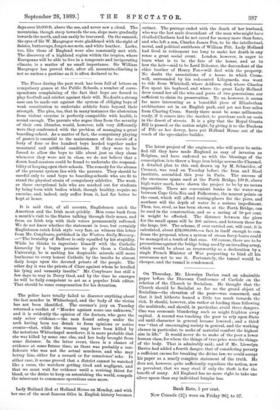On Thursday, Mr. Llewelyn Davies read an admirable paper before
the Diocesan Conference of Carlisle on the relation of the Church to Socialism. He thought that the Church should be Socialist so far as the grand object of Socialism—the elevation of the poor—was concerned, and that it had hitherto leaned a little too much towards the rich. It should, however, aim rather at leading than following the multitude, and should, in particular, avoid three dangers. One was economic blundering such as might frighten away capital. A second was teaching the poor to rely upon State aid until character in general became lowered ; and a third was "that of encouraging society in general, and the working classes in particular, to make of material comfort the highest aim in life." It would never do to make of the poor a lower human class, for whom the things of true price were the things of the body. That is admirably said ; and if Mr. Llewelyn Davies had added a fourth danger, that of considering poverty a sufficient excuse for breaking the divine law, we could accept his paper as a nearly complete statement of the troth. He does not, however, quite sufficiently repudiate the notion, now so prevalent, that we may steal if only the theft is for the benefit of many. All England has no more right to take one silver spoon than any individual burglar has.






































 Previous page
Previous page